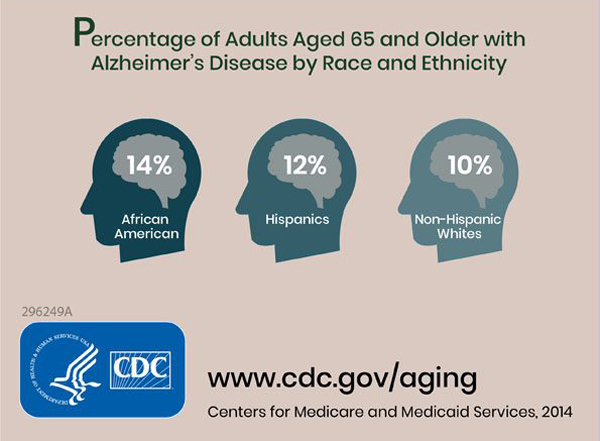
Share On Social!
The U.S. burden of Alzheimer’s disease and related dementias will more than double within 50 years, and Latinos will suffer the biggest rise, according to a new study from the Centers for Disease Control and Prevention.
CDC indicates the total number of Alzheimer’s cases will rise from 4.9 million in 2014 to 1.4 billion in 2060.
But themost staggering rise is among Latinos:
- Latinos living with Alzheimer’s will rise from 430,000 in 2014 to 3.2 million in 2060. That is a more than seven-fold increase in that span.
- African Americans living with Alzheimer’s will rise from 573,000 million in 2014 to 2.2 million in 2060.
- White (non-Latinos) living with Alzheimer’s will rise from 3.7 million in 2014 to 7.4 million in 2050, before starting to decline to 7.1 million in 2060.
 The increases are a result of fewer people dying from other chronic diseases and surviving into older adulthood when the risk for Alzheimer’s disease and related dementias rises.
The increases are a result of fewer people dying from other chronic diseases and surviving into older adulthood when the risk for Alzheimer’s disease and related dementias rises.
“This study shows that as the U.S. population increases, the number of people affected by Alzheimer’s disease and related dementias will rise, especially among minority populations,” said CDC Director Dr. Robert R. Redfield, in a press release. “Early diagnosis is key to helping people and their families cope with loss of memory, navigate the health care system, and plan for their care in the future.”
The Current State of Latinos & Alzheimer’s
Every 65 seconds, someone develops Alzheimer’s disease.
 Among people ages 65 and older, African Americans have the highest prevalence of Alzheimer’s disease and related dementias (13.8%). This is followed by Latinos (12.2%), and non-Hispanic whites (10.3%), American Indian and Alaska Natives (9.1%), and Asian and Pacific Islanders (8.4%).
Among people ages 65 and older, African Americans have the highest prevalence of Alzheimer’s disease and related dementias (13.8%). This is followed by Latinos (12.2%), and non-Hispanic whites (10.3%), American Indian and Alaska Natives (9.1%), and Asian and Pacific Islanders (8.4%).
Latinos in United States are 1.5 times more likely to develop Alzheimer’s than White non-Latinos.
In the U.S., two-thirds of Alzheimer’s patients are women. Latinas are at higher risk than non-Latinas.
Alzheimer’s Risk Factors among Latinos
The rising rate of Alzheimer’s among Latinos makes it very important to understand how the disease develops and also the risk factors associated with Alzheimer’s disease among Latinos.
The primary risk factor for Alzheimer’s disease and related dementias is age.
But race and ethnicity, mainly genetics, play key demographic risk factors. A childhood virus also may play a role in Alzheimer’s development.
Also, lifestyle and socioeconomic risk are other factors that affect disease prevalence in Latinos.
Diabetes rates, both diagnosed and undiagnosed, is 86% higher among adult Latinos than their white peers, according to a 2014 CDC report that suggests that diabetes could contribute to the rising rates of Alzheimer’s in Latinos.
Recent research by University of Illinois, Chicago found that some of the genes affected by alcohol and inflammation are also concerned with the disease. Alcoholism is a rising health crisis for Latinos. Lack of sleep may also boost risk of Alzheimer’s.
Not only that, Latino caregivers of Alzheimer’s Disease patients deal with high levels of stress, anxiety, and depression symptoms, studies show.
Whether behavioral, lifestyle, or genetic risk factors are a cause, experts agree on one thing: The time to act is now.
How You Can Get Involved
September 2018 marks the 7th World Alzheimer’s Month. This is a chance for people to raise awareness, raise funds, and find out more about how they can participate in research.
Check out Alzheimer’s Association resources for Latinos in English or Spanish. Alzheimer’s Association also has local chapters that provide services within the community.
Get active with the Walk to End Alzheimer’s. This event raises support and awareness in more than 600 communities nationwide.
The Glenn Biggs Institute for Alzheimer’s and Neurodegenerative Diseases at UT Health San Antonio is dedicated to diseases like Alzheimer’s and improve care through patient care, education and advanced treatments in research and clinical trials.
Explore More:
Healthy Families & SchoolsBy The Numbers
142
Percent
Expected rise in Latino cancer cases in coming years



